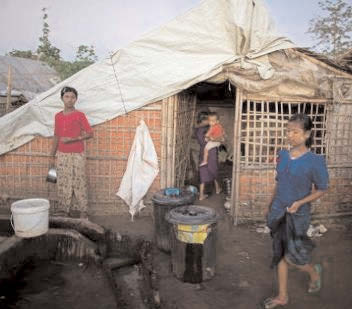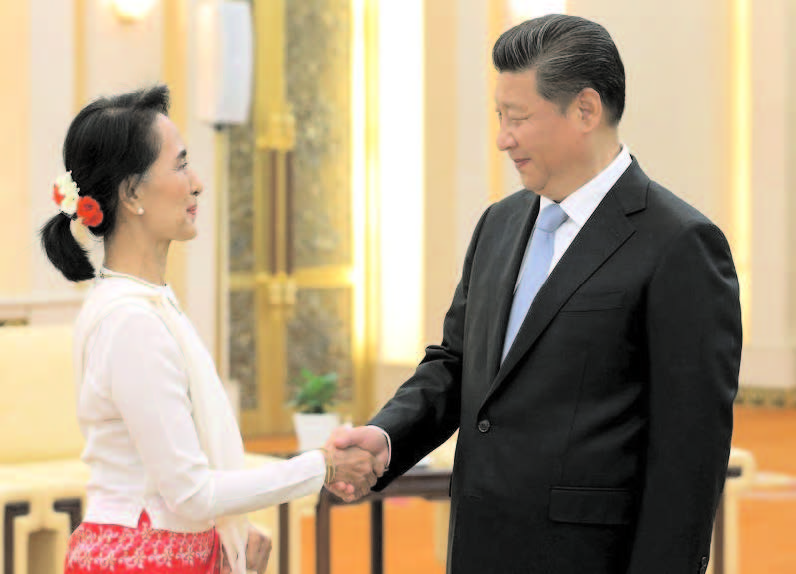
Aung San Suu Kyi was awarded the Nobel Peace Prize in 1991 for her “non-violent struggle for democracy and human rights”. Back then, she was a campaigner for those things, spending a total of 15 years under house arrest.
She knows what it’s like to have rights and freedom taken away.
But now that she is in perhaps the ultimate position of power in Myanmar, there is no sign that she is going to defend the rights of people who have been detained simply because of who they are.
Tens of thousands of Muslims, mainly Rohingya, have been kept in camps in western Myanmar’s Rakhine State for almost four years since their homes and communities were attacked.
They were horrific events that were fanned by a powerful, nationalist Buddhist agenda – alive and well today – and it’s a movement Aung San Suu Kyi seems afraid of upsetting.
After decades of campaigning against the previous military regime, her National League for Democracy party won last November’s general election and, even though the constitution prevents her from becoming president, she made it clear that she would be in charge and gave herself the title of State Counsellor.
Her choice of Religious and Cultural Affairs Minister raised eyebrows. Thura Aung Ko is a former army general and was a deputy in the same ministry under the previous military-backed government. And, so far, the new government isn’t sending any signals that it will adopt a policy to give rights to Rohingya who, in Myanmar, are widely regarded as illegal immigrants from neighbouring Bangladesh.
On his first day on the job in the new administration, Thura Aung Ko gave a media interview in which he said that Muslims and Hindus were “associate citizens”, referring to the 1982 citizenship law that places people into three categories depending on their status.
He then visited leaders of a nationalist Buddhist movement who regularly spew anti-Islam rhetoric. It’s not known what was discussed at the meeting but it sent a bad message, something Aung San Suu Kyi herself has also been guilty of.
In April, the United States embassy in Yangon released a statement, offering their condolences for people who were killed when a boat sunk off Rakhine State. The people onboard were Rohingya and that’s exactly what the US statement called them.
That led to protests outside the embassy by people who refuse to recognise the term Rohingya because it’s not one of the official ethnic minority groups in Myanmar.
The response from Suu Kyi? Government officials sent a letter to the US ambassador and other diplomats urging them to refrain from using the word Rohingya.
Yes, it’s very early days in the life of the new government and there are many problems in this country to solve. Yes, the plight of the Rohingya is a very complex issue. Yes, the new government is talking about new laws to safeguard religious freedom and to get tough on hate speech.
But it’s not enough.
Here’s what we also know: Around 100,000 people have been living in squalid conditions for almost four years. They have no rights and many have died in a desperate attempt to leave. Over the past year though, the number of departures fell, partly because people wanted to see what the new government would do for them.
What Aung San Suu Kyi has at her disposal now is the power to speak out. Words can be powerful. They can offer hope. Particularly when they come from someone who built her name on a fight for freedom and rights.
But when it comes to the Rohingya, there has been nothing but silence; meaning for them, hope is already fading so early in Myanmar’s new democracy.





The Barbaric Burmese Military regime and their actions against Rohingya.
Since independence of Burma on 4 January 1948,Rohingyas are suffering and facing unexpected action of 19 full- fledged operation with frequently state patronized communal riots, have been engineered and carried out of resulting in their death, massive destruction of their settlements , holy places of worship, economic bases and expulsion from their hearths and homes.
Followings are some of the major armed operations:
01. Military Operation (5th Burma Regiment) November 1948
02. Burma Territorial Force (BTF) Operation 1949-50
03. Military Operation (2nd Emergency Chin regiment) March 1951-52
04. Mayu Operation October 1952-53
05. Mone-thone Operation October 1954
06. Combined Immigration and Army Operation January 1955
07. Union Military Police (UMP) Operation 1955-58
08. Captain Htin Kyaw Operation 1959
09. Shwe Kyi Operation October 1966
10. Kyi Gan Operation October-December 1966
11. Ngazinka Operation 1967-69
12. Myat Mon Operation February 1969-71
13. Major Aung Than Operation 1973
14. Sabe Operation February 1974-78
15. Nagamin Operation February 1978-79 (Around 400,000 people have forced migrated from Arakan State )
16. Shwe Hintha Operation August 1978-80
17. Galone Operation 1979
18. Pyi Thaya Operation 1991-92
19. Na-Sa-Ka Operation 1992 (Around 250, 000 People have forced migrated)
20. The Genocide has started on 3 June 2012, the recent genocidal campaigns against Rohingya have been documented by Human Rights Watch ( HRW ) , Amnesty International ( AI ) and UN as :
1- At least 20,000 people killed
2- At least 3,500 people missing
3- At least 1000 Women raped
4- At least 25,000 houses burnt
5- At least 180,000 displaced
6- At least 100 Masjid & Madrasas razed
World crime & action by brutal military regime:
1. Denial of Citizenship by the act of 1982
2. Restriction of Movement
3. Forced Labor
4. Land Confiscation, Forced Eviction and House Destruction
5. Restrictions on Marriage of Rohingya
6. Arbitrary Taxation and Extortion
7. Registration of Births and Deaths in Families
8. Deprivation of Right to Education
9. Arbitrary arrest, torture and Extra- Judicial Killing
10. Abuse of Rohingya Women and Elders
11. Depopulation law against Rohingya community by making new population law only 2 children for Rohingya
12. Undocumented refugees & statelessness
13. Involvement in human trafficking by authority to reduce Rohingya population
14.Innocent Rohingya prisoners in the neighbor countries (Bangladesh, India, Nepal ,Thailand, Pakistan, Indonesia, Malaysia, Saudi Arabia ).
False Allegation and sending wrong information to the world Media and community by the Burmese military regime:
Arakan State was an independent State from 1434 – 1784.
Arakan state has occupied by forced in 1784 by Burmese Bodupaya , in 1826 British empire has occupied whole Burma,.
Burmese military regime is lying to the International community that Rohingya people are coming from Bangladesh or illegal migrant etc. which is completely illogical and false.
They want to eliminate whole the ethnic Rohingya from Arakan State because of religious back ground.
Actually, Bengali language has completely different dialect and the script is similar to Hindi alphabets and the language too.
Rohingya language is formed from the words of Urdu, Hindi, Arabic, English, Bangla and Burman etc.
However, Rohingya community does not use the script of Bengali which has taken from India (Hindi Script) so Rohingya does not learn, read, write or speak Bengali language anywhere.
Bengali people can’t speak or understand Rohingya language and the dialect too. So, Rohingya community can realize it easily when a Bengali person speaks face to face.
Cultural difference:
Rohingya peole have own cultural dress, food, communication and other difference habits from Bengali people.
Bengali people follow Indian culture, dress and most of things.
TRUTH vs LIE: GOVERNMENTS’ RECOGNITION OF ROHINGYA
Burma’s falling into the hands of Dictator Ne Win in 1962, erupted a volcanic lie on the existence of Rohingya through propagandas, policies and laws.
His successive military regimes continued the legacy of lie – “There is no Rohingya.”
“We don’t have a people called Rohingya”, [July 13, 2013] become the favourite phrase of Thein Sein’s government.
Endorsing the lie, the current commander-in-chief of Burma, Min Aung Hlaing, said, “As we have said before, there are no Rohingya.” [May 13, 2016]
Even the Nobel Peace Laureate and Woman above the current President, Aung San Suu Kyi, “Doesn’t want to hear” the term ‘Rohingya’. [May 6, 2016]
They continue to lie and ignore the existence and recognition of Rohingya by Governments in Post-Independence Era.
The truth is Rohingya existed and recognized as an Ethnic group of Burma.
Following Independence, the first elected President of Burma, Sao Shwe Thaike, said, “Muslims of Arakan (Rohingyas) certainly belong to one of the indigenous races of Burma…. In fact, there is no pure indigenous race in Burma, if they do not belong to indigenous races of Burma, we also cannot be taken as indigenous races of Burma”
He was not alone. U Nu, the first Elected Prime Minister of #Burmaannounced in September 28, 1954, “The people living in northern Arakan are our national brethren. They are called Rohingyas. They are on the same par in the status of nationality with Kachin, Kayah, Karen, Mon, Rakhine and Shan.”
U Ba Swe, the second Prime Minister of Burma assured Rohingya in November 4, 1959. “The Rohingya has the equal status of nationality with Kachin, Kayah, Karen, Mon, #Rakhine and Shan.”
Unlike Min Aung Hlaing, Brigadier Aung Gyi, Vice Chief of Staff of Burma Armed Forces, observed the Right to Self-identification – “#Rohingyaleaders asked us not to call the Rohingya “Khaw Taw”, nor “Bengali”, nor Chittagonian Kalar (niggers), nor “Rakhine #Muslims”. Instead they said their preferred and self-referential ethnic name was the Arabic word Rohingya….” [November 15, 1951]
In Burma, LIE Continues; TRUTH been Ignored.